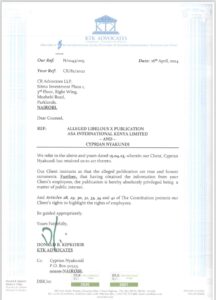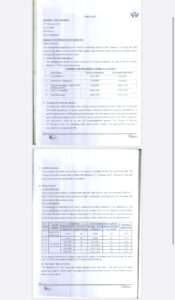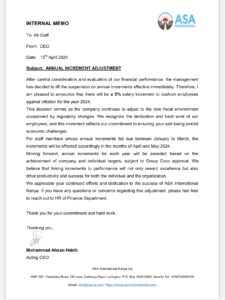Investigations
Explosive Letter By ASA International Kenya Staff Exposes Alleged Rot In The Firm
The company has been a subject of negative media attention for the last few weeks with the dejected staff resorting to using influential bloggers to air their grievances that narrows down to claims of exploitation by poor pay and harsh working conditions.
Published
1 year agoon

The Staff Welfare, ASA Kenya Limited has written an explosive letter to the group’s CEO Ms. Karin Kersten in the United Kingdom exposing the rot and mismanagement in the company.
In the letter dated 20th April 2024 seen by Kenya Insights, the staff are accusing the company’s local management of playing deaf to the concerns they’ve been raising.
The company has been a subject of negative media attention for the last few weeks with the dejected staff resorting to using influential bloggers to air their grievances that narrows down to claims of exploitation by poor pay and harsh working conditions.
Gagging.
ASA Kenya has attempted to gag the flow of information from the staff to the public by threatening bloggers with SLAPP suits. Cyprian Nyakundi, an influential blogger who blew up the intrigues of the company has already been served with a cease and desist letter from the company.
“Bully company ASA International limited that wants me to stop posting their staff complaints on my X. The Bangladeshi crooks running it must know this is Kenya and our constitution allows that.” The blogger said in reaction to the demand letter.
The case throws a spotlight on the broader issues of corporate accountability and employees’ rights in Kenya. It is a stark reminder that international companies operating in Kenya must align with the country’s legal framework and respect the values enshrined in the Kenyan Constitution. The blogger’s determination to continue posting about staff complaints is a testament to the unwavering commitment to transparency and justice for the employees.
This legal rebuttal sends a clear message to international entities operating in Kenya: adherence to the constitutional rights of Kenyans is non-negotiable. The blogger, with the legal backing of Donald Kipkorir, has indeed set a precedent for the protection of free speech in the digital age and the advocacy for employee rights in the face of corporate intimidation.
For companies like ASA International Limited, the message is clear – Kenya stands firm on the principles of its Constitution, and any attempts to undermine these principles will be met with strong legal resistance. The case continues to evolve, and it serves as a crucial example of the ongoing dialogue between corporate practices and the fundamental human rights of employees.
Read copy of the letter below from the staff highlighting their grievances.
Staff Welfare,
ASA International Kenya,
Nairobi, Kenya. 20th April 2024.
To,
The Group Chief Executive officer, ASA International,
Highdown House, West Sussex, BN99 3HH
United Kingdom.
Dear Ms. Karin Kersten,
We hope this letter finds you in good health and high spirits.
We, the Staff of ASA Kenya, write to you today with a sense of urgency regarding several critical issues that have been persistently affecting our work environment and morale. Despite our dedication and commitment to the company’s success, there are pressing matters that require your immediate attention and action for the betterment of our workforce and the organization as a whole.
Protest against proposed downward annual salary increment and non-implementation of two-year review as per circular(C/No-AO4/02/19)
We’re expressing our strong protest against the proposed downward annual salary increments, which deviate from the established norms and agreements regarding staff compensation.
It is disheartening to learn that the management is considering reducing the annual salary increments to a mere 5 percent of the basic staff salary, contrary to the customary increments of 10 percent. This decision not only fails to acknowledge the hard work and dedication of the Kenyan staff but also undermines the principles of fair compensation and employee welfare.
Furthermore, we are deeply disappointed by the management’s failure to implement the circular on the two-year salary review, which clearly stipulates that staff salary reviews should be conducted every two years at a percentage corresponding to the inflation rate.
Additionally, the circular mandates that high-performing staff should receive annual salary increments of 10 percent of the basic salary, while low-performing staff should receive 5 percent increments. The management’s disregard for these agreements is unacceptable and reflects a lack of respect for the rights and well-being of the employees.
The Kenyan entity has consistently served as the backbone of ASA International, thanks to the tireless efforts and dedication of the Kenyan employees. However, the proposed downward review of annual salary increments is not only demoralizing but also fails to address the pressing needs of the staff, who are struggling to cope with the ever-rising cost of living.
Therefore, we demand that the management revises the annual salary review upwards to reflect the true value of our contributions and to ensure that staff members can maintain a decent standard of living. Additionally, we propose the following minimum salaries for staff in each category to align with industry standards and cost of living realities.
JOB GROUP – PROPOSED AMOUNT (KES)
Loan Officers – 50000
Assistant Branch Manager- 75000
Branch Manager – 120000
Area Manager- 180000
Regional Manager – 220000
Head Office staff – Minimum 100000
We believe that implementing these salary revisions is essential to recognize and reward the hard work and dedication of the ASA Kenya staff. Failure to address these concerns will only serve to further demoralize the workforce and undermine the company’s reputation as an employer of choice.
Thank you for your attention to this matter. We expect prompt action to address our demands and ensure fair and equitable treatment of all ASA Kenya staff members.
These adjustments are crucial to alleviate the financial burdens faced by the local Kenyan staff and enable us to cope with the escalating cost of living in Kenya.
Demand for Equal Pay for Equal Work:
Another pressing issue is the glaring disparities in salaries between Kenyan local staff and expatriate staff from Bangladesh, despite holding similar positions and responsibilities. Kenyan staff are paid significantly less than their expatriate counterparts, with the minimum salary for Kenyan RM not exceeding Kes 100,000, while expatriates earn not less than Kes 250,000.
Additionally, expatriates enjoy benefits such as the company-paid furnished house rent and utilities, which are not extended to Kenyan staff.
This discrepancy violates Kenyan labor laws on equal pay for equal work. Hence, we demand immediate adjustments to rectify the salary ratio between expatriates and local staff.
Furthermore, expatriates receive bonuses equivalent to their full gross salary on July every year, while Kenyan staff only receive bonuses equivalent to their basic salary only on December every year. We demand that Kenyan staff be receiving bonuses equivalent to their full gross income, aligning with the benefits enjoyed by expatriate employees.
Concerns Regarding Proposed Performance Management System in Kenya.
We are expressing the concerns of the Kenyan staff regarding the proposed performance management system that is set to be piloted in Kenya. While we appreciate the decision to choose Kenya for this initiative, we have several apprehensions about the system that we feel compelled to bring to your attention.
Firstly, we are concerned about the structure of the performance targets outlined in the proposed system. The current allocation of 45 percent of targets on OLP (Outstanding Loan per Borrower) and 30 percent of targets on the number of borrowers by the end of the year poses significant challenges, particularly for staff members with high portfolio sizes.
This structure creates an inherent imbalance where individuals with larger portfolios are expected to continually increase their borrower numbers and outstanding loans, placing undue pressure on them to achieve unrealistic targets.
Furthermore, there is a lack of clarity regarding the rewards for employees who are rated as high performers.
While we acknowledge the importance of recognizing and incentivizing exceptional performance, the absence of clear guidelines on the rewards for meeting or exceeding targets is concerning.
We believe that there should be transparent criteria outlining the percentage of salary increments or other incentives that high-performing employees can expect to receive. This would not only provide clarity but also serve as a motivating factor for employees to strive for excellence.
Additionally, there is a prevailing fear among the staff that this performance management system may be introduced as a means to eliminate the traditional annual salary increments. We adamantly oppose any such move, as it would undermine the morale and well-being of the employees, reducing them to mere instruments for achieving targets without any assurance of fair rewards for their efforts.
In light of these concerns, we urge you to reconsider the proposed performance management system and address the issues raised by the Kenyan staff. We believe that a collaborative approach that takes into account the feedback and perspectives of all stakeholders will result in a more effective and equitable system that fosters employee motivation and engagement.
Discrimination on staff promotions
We are raising with a deep sense of concern the alarming rate of discrimination in staff promotions within ASA Kenya. Currently, promotions are not being conducted based on merit, education, experience, or performance, but rather on personal relationships with supervisors.
This practice has created an environment where female staff members are more favored. This discriminatory practice not only undermines the principles of fairness and equality but also erodes the morale and motivation of male employees within the organization. Despite their hard work, dedication, and possession of the necessary qualifications, male employees are being denied opportunities for advancement simply because they do not engage in inappropriate behavior to carry favor with their superiors.
Numerous attempts have been made to address this issue through the Kenyan GMC, led by one Ms. Lynette Omollo. However, our efforts have been met with indifference, as consistently sides with the management, further perpetuating the culture of discrimination and favoritism.
As employees who believes in the values of fairness, equality, and meritocracy, we urge you to take immediate and decisive action to address this systemic issue.
It is imperative that promotions within ASA Kenya are conducted in a transparent and merit-based manner, where individuals are rewarded based on their qualifications, performance, and dedication to the organization.
We propose the following steps to rectify the situation:
1. Implement a formalized promotion process that is transparent, fair, and based on objective criteria such as merit, education, experience, and performance.
2. Provide training and education to supervisors and management on the importance of fairness and equality in the workplace, and the consequences of engaging in
discriminatory practices.
3. Establish an independent committee to review promotion decisions and ensure compliance with company policies and values.
4. Create a safe and confidential mechanism for employees to report instances of discrimination or harassment without fear of retaliation.
By taking proactive measures to address this issue, ASA Kenya can create a more inclusive and equitable workplace where all employees have the opportunity to succeed based on their abilities and contributions.
We trust that you will give this matter the serious attention it deserves and take the necessary steps to rectify the situation promptly.
Demand for removal of ASA Kenya Grievance and mitigation committee representative
We, the staff of ASA Kenya, are writing to you with a matter of utmost importance regarding the composition of the Grievances Mitigation Committee. Specifically, we are addressing the ineffectiveness and lack of impartiality demonstrated by Ms. Lynnette Omollo, the current committee representative.
It has become abundantly clear that Ms. Omollo has not fulfilled her duties effectively in addressing the grievances raised by the staff.
Numerous complaints, including allegations of bias in promotions due to sexual favors and incidents of sexual harassment by expatriates towards Kenyan staff, have been brought to her attention. However, Ms. Omollo consistently sides with the management and expatriates, failing to provide adequate support and justice for the victims.
This pattern of behavior has created a sense of distrust and disillusionment among the staff, who feel that their concerns are not being taken seriously and that their rights are being disregarded. Ms. Omollo’s failure to impartially address grievances has further exacerbated existing tensions and contributed to a toxic work environment.
Therefore, on behalf of the ASA Kenyan staff, we demand the immediate removal of Ms. Lynnette Omollo from her position as the Grievances Mitigation Committee representative.
It is imperative that her replacement be someone who is committed to upholding fairness, impartiality, and justice for all staff members.
We urge you to take swift and decisive action to address this issue and ensure that the Grievances Mitigation Committee is composed of individuals who will advocate for the rights and well- being of the entire staff body.
Staff Joining Trade Union
We would like to inform you on behalf of the ASA Kenya staff that we are currently in the advanced stages of joining a trade union for the benefit of all employees. It is our collective decision to seek representation through a trade union to advocate for our rights and interests in the workplace.
We kindly request management’s cooperation and compliance in facilitating the remittance of union fees from staff salaries. This cooperation is essential to ensure the smooth functioning of the trade union and to uphold the rights of employees to organize and bargain collectively.
It has come to our attention that there is a provision in the HR manual which prohibits employees from joining trade unions. We wish to highlight that this provision is in direct violation of the Employment Act chapter 226 of the Kenyan Constitution, which explicitly guarantee the freedom of association and the right of employees to join trade unions of their choice.
Therefore, we demand the immediate amendment of this particular provision in the HR manual to align with the legal framework of the country and to respect the fundamental rights of employees. By prohibiting employees from joining trade unions, the company is not only violating the law but also depriving employees of their democratic rights to organize and collectively bargain for better working conditions.
We urge the management to recognize the importance of respecting and upholding the rights of employees as enshrined in the Constitution and labor laws of Kenya. Cooperation and collaboration between the management and the trade union will contribute to a more harmonious and productive working environment for all stakeholders.
Forced and punitive staff transfers
We are raising a concerning issue regarding forced and punitive staff transfers within the organization. It has come to our attention that there have been numerous cases of staff being transferred outside their divisions and far away from their families without their consent or adequate consideration for their well-being.
These forced transfers have had detrimental effects on the affected staff, their families, and the overall performance of the organization. Many employees have experienced family breakups, resignation, and a decline in performance due to the stress and strain of being separated from their loved ones and support networks.
Furthermore, the lack of consultation and consideration for the well-being of staff before implementing transfers has resulted in significant mental health challenges among affected employees. The stress and anxiety associated with being forcibly relocated without their consent have taken a toll on the mental well-being of staff, leading to decreased productivity and engagement in their work.
In light of these concerns, we demand that there be a transparent and consultative process between management and staff before any transfer decisions are made. It is imperative that employees have the opportunity to express their preferences, concerns, and constraints regarding potential transfers, and that their well-being is given due consideration in the decision-making process.
We propose the following measures to address this issue:
Establish a formal policy or procedure for staff transfers that includes provisions for consultation with affected employees and consideration of their well-being.
Ensure that transfers are made on a voluntary basis whenever possible, and that employees are provided with adequate information and support to facilitate their transition to a new location.
Provide assistance and resources to employees who are transferred to help them adjust to their new environment and mitigate the impact on their families and personal lives.
Implement measures to monitor and evaluate the impact of staff transfers on employee well-being, performance, and retention, and make adjustments to the transfer process as needed.
Re-assessment of Transport reimbursement and Airtime expense policy.
It has become apparent that the current classification of transport reimbursement and airtime expenses as staff allowances does not accurately reflect their intended purpose nor the benefits
they provide to our employees. Both of these expenses primarily serve to facilitate company operations and activities rather than directly benefitting individual staff members.
Transport reimbursement plays a crucial role in covering company expenses related to group visits and the collection of loan installments. While it indirectly supports staff activities, its primary function is to enable essential company functions and contribute to the overall success of our operations.
Similarly, airtime expenses are essential for staff members to communicate with clients, follow up on overdue payments, and ensure effective client relations. However, categorizing airtime expenses as a staff allowance fails to recognize that its primary purpose is to facilitate business operations and support staff in carrying out their duties effectively.
Furthermore, treating these expenses as staff allowances has unintended consequences, particularly regarding taxation. By including these expenses in staff salaries, employees are subjected to unnecessary taxation burdens, despite the fact that the expenses primarily benefit the company rather than individual staff members.
To address these concerns and ensure fairness for all employees, we respectfully request a reassessment of the policy regarding transport reimbursement and airtime expenses. Instead of treating them as staff allowances, we propose that they be accurately classified as company expenses that directly contribute to our operations.
By making this adjustment, we can alleviate the tax burden on our employees while ensuring that our policies accurately reflect the purpose and benefits of these expenses. Additionally, we believe that this change will demonstrate our commitment to supporting our employees and optimizing company resources effectively.
Conclusion
It is imperative that the above staff concerns are addressed promptly and effectively to ensure a conducive and harmonious work environment. Therefore, we demand that all staff concerns raised be addressed within the next 14 days. Failure to address the above issues, a notice of industrial action shall be issued.
We believe that by taking swift action to address these concerns, you will demonstrate your commitment to the well-being and satisfaction of the entire staff body. We are willing to engage in constructive dialogue to find mutually acceptable solutions to these issues and prevent any disruptions to our operations.
We urge all staff members to remain calm and patient as we await a response from the group CEO regarding our concerns. We understand the frustration and uncertainty that many of you may be feeling, but it is essential that we maintain a unified and composed approach during this time.
In the meantime, we kindly request all staff to continue with their normal duties and give their utmost effort to produce excellent results and meet the targets set by the company management. Our commitment to delivering quality work remains unwavering, and it is crucial that we uphold our professional standards despite the challenges we may be facing.
Your cooperation and solidarity during this period are greatly appreciated. Together, we can achieve a positive outcome and ensure that our voices are heard and our concerns addressed.
Yours Faithfully,
ASA Kenya Staff Welfare.
Deescalation
In the middle of the accusations, the management has attempted to deescalate the crisis by issuing a meager 5pc pay increase which some of the staff have dismissed as deceptive.
“The company is actively trying to deceive us with a onetime 5% increment in gross salary contrasting sharply with the guaranteed annual increments of 10%.” One of the staff alleged.
Kenya Insights allows guest blogging, if you want to be published on Kenya’s most authoritative and accurate blog, have an expose, news TIPS, story angles, human interest stories, drop us an email on [email protected] or via Telegram
📩 Got a Tip, Story, or Inquiry? We’re always listening. Whether you have a news tip, press release, advertising inquiry, or you’re interested in sponsored content, reach out to us! 📬 Email us at: [email protected] Your story could be the next big headline.

You may like

Bitcoin Keeps Soaring To New Record Highs, Surpassing $118,000

Son of Mexico’s ‘El Chapo’ to Plead Guilty in US Drug Case

Kenya Power on the Spot Over Sh274M Paid to ‘Absent’ Consultant

Boniface Kariuki To Be Laid To Rest In Kangema

PHOTOS: Gachagua Lands in Seattle to Kick Off Two-Month US Tour

This Was No Protest But A Failed Coup Attempt, Murkomen Decries

Insider Wars: How Choice For Flagbearer Now Threatens to Split Opposition Camp Ahead of 2027

I Was Helping My Boss Organise a Surprise for His Wife Only to Discover I Was the Side Dish Being Surprised

Trump Presses African Leaders To Take Deported Migrants, Sources Say

Ruto Re-Gazettes Appointment of Erastus Ethekon As IEBC Chairperson Along Six Commissioners Moments After Court Ruling

From Billionaire to Broke: The Fall of Humphrey Kariuki’s Empire

How NCBA Software Engineer Opened Floodgates For Mobile Banking System Fraud

Investigation Exposes Alleged Sex Crimes at Alliance Girls High School Amid Institutional Cover-Up

EXCLUSIVE: How Corruption and Mismanagement Have Brought Kenyatta National Hospital to Its Knees

Housing PS Charles Hinga Entangled in Sh 2B Tender Scam

WATCH: New CCTV Footage Reveals Police Brought Ojwang to Hospital Already Dead

Inside the Kibaki Estate Dispute: Power, Bloodlines & the Unfolding Legal Drama

Details Emerge In How ‘Death Squad’ Hatched Plan To Keep Dark Ojwang’s Interrogation Secret in Cell Ending in Death

New Details Reveal How Ojwang Was Tortured into a Coma in Karura Forest in the Presence of a Senior Officer

Former PS Warns of Hidden Hand Behind Mwaura’s Sh1.6B HF Group Acquisition, Predicts Delisting
Most Popular
-

 Investigations7 days ago
Investigations7 days agoInvestigation Exposes Alleged Sex Crimes at Alliance Girls High School Amid Institutional Cover-Up
-

 Grapevine2 weeks ago
Grapevine2 weeks agoCS Alfred Mutua Embroiled in Custody Battle After A ‘Quick’ Moment With Kenyan Girl in Dubai
-

 Opinion2 weeks ago
Opinion2 weeks agoWhy Ruto Dumped Isiolo Governor Abdi Guyo: A Political Betrayal in the Making
-

 News2 weeks ago
News2 weeks agoOle Kina Fragrance Sets Kenyan Market Abuzz with Million-Shilling Expansion
-

 Americas7 days ago
Americas7 days agoHow A Nigerian Yahoo Boy’s Elaborate Plan to Scam Trump Backfired As FBI Goes After Him
-

 News1 week ago
News1 week agoOutrage as Kenya Agrees to Buy Defence Equipment From UK in Ksh12.5 Billion Deal
-

 Politics3 days ago
Politics3 days agoMoses Kuria Resigns from Kenya Kwanza Government
-

 News6 days ago
News6 days agoIrony of Lydia Mathia Seeking Court Interventions Months After Calling Court Orders ‘Mere Papers’ While Spearheading Evictions


